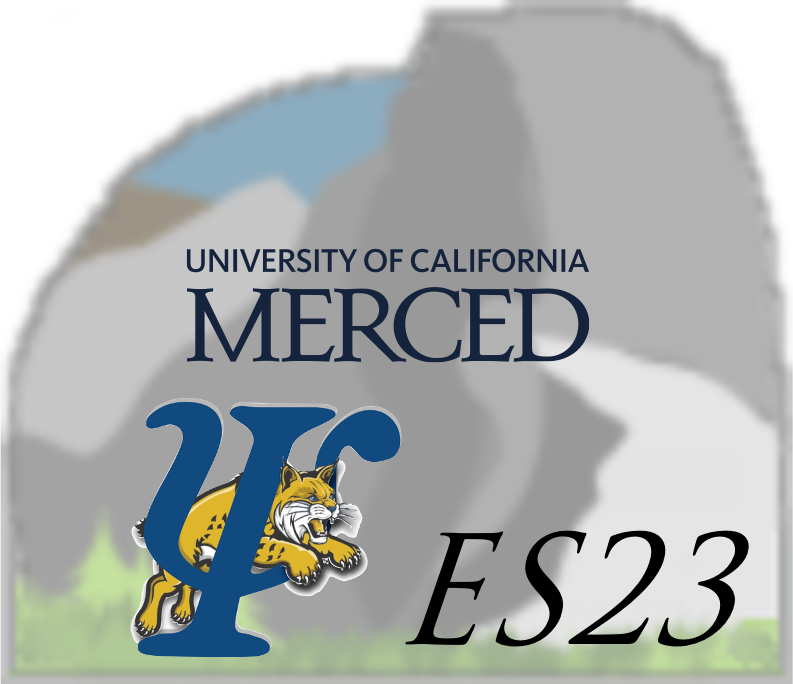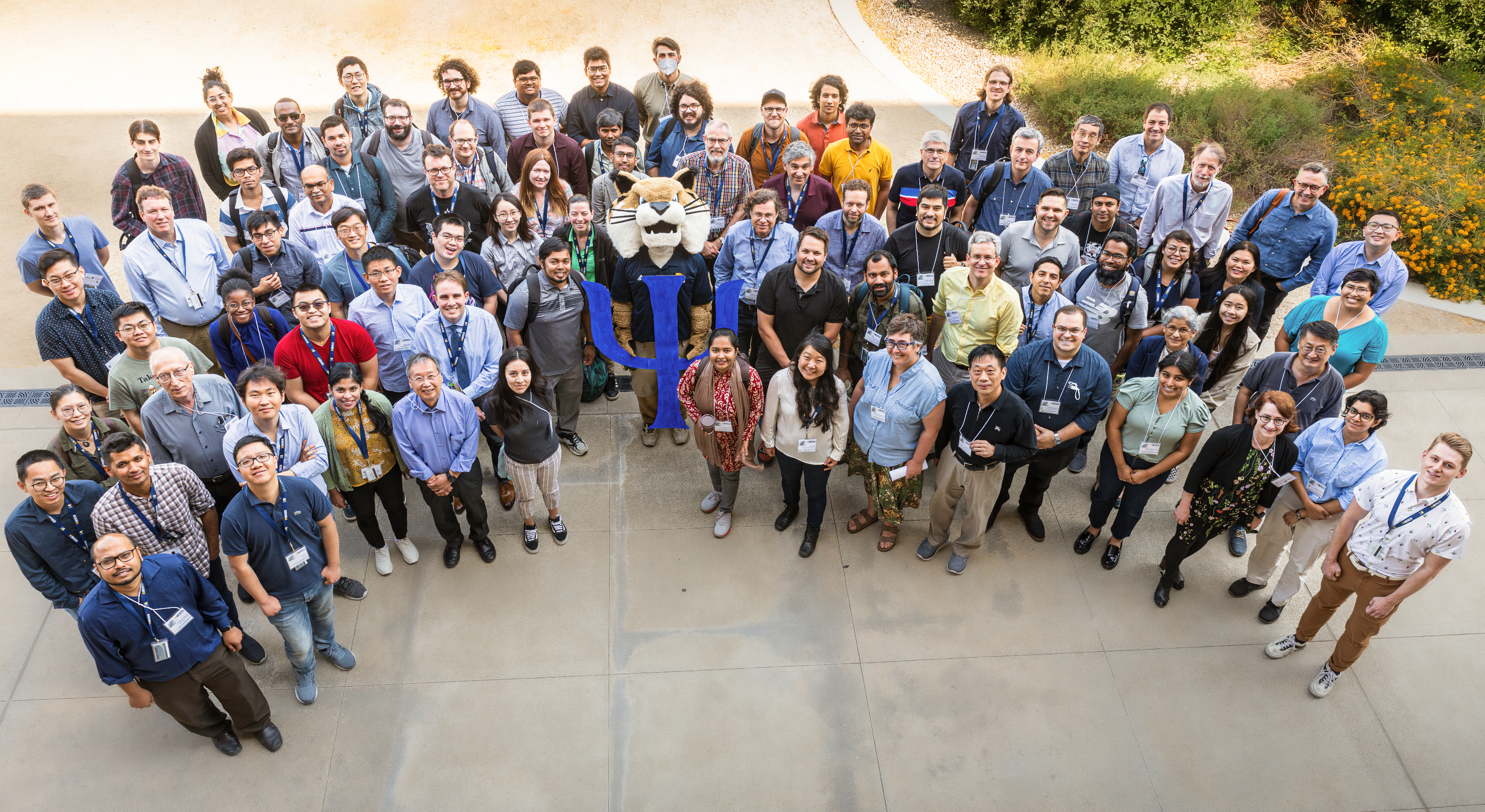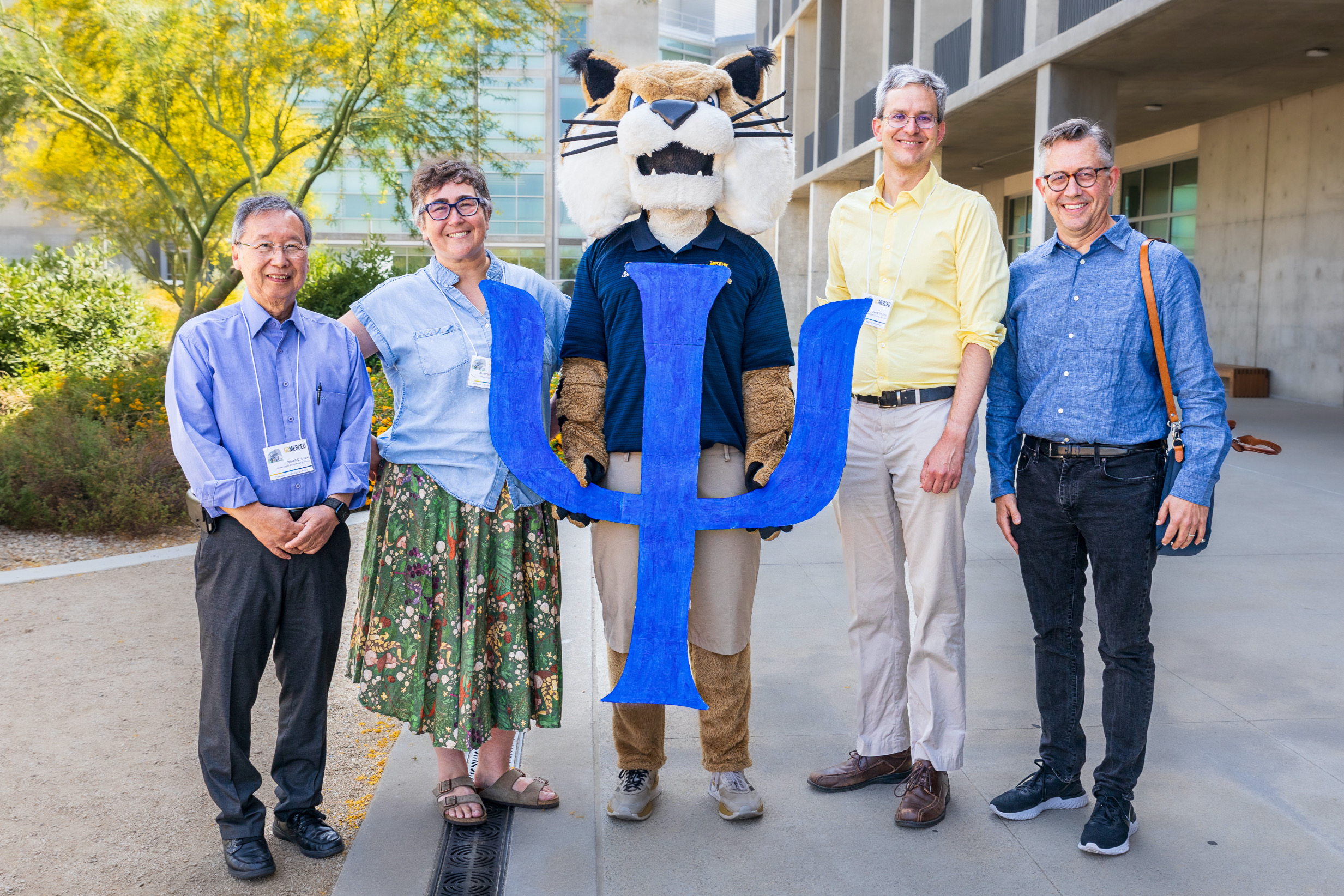The 2024 workshop will be held at Boston University, 2-5 June.
13-16 June 2023: 35th Workshop on Recent Developments in Electronic Structure Methods, UC Merced 
See also an article from the UC Merced news office.
The Electronic Structure Workshop series brings together researchers to discuss new methods for computing previously inaccessible properties, breakthroughs in computational efficiency and accuracy, and novel applications of these approaches to the study of molecules, liquids, and solids. Since 1989, the Electronic Structure Workshop has been hosted by more than a dozen universities and institutions. This year, the workshop will be hosted at the newest UC campus: the University of California, Merced.
To sign up for the Electronic Structure Workshop email list, where you will receive updates about this workshop and future ones, please fill out your info here!
This is not a hybrid meeting, but limited virtual participation will be enabled. This will consist of streaming of talks, posting of the recordings afterward, posting of PDFs and recorded presentations for the posters, and organization of discussion groups for virtual attendees.
On-campus housing will be organized. Prices are $58 per person per night for single or double rooms, mostly being covered by our NSF grant. On-campus dining is included at the Pavilion.
All attendees are encouraged to present a poster about their research at the poster session. Posters are welcome on any topic related to electronic structure, including both methods and applications. There will be poster prizes for students and postdocs sponsored by the Journal of Physics: Condensed Matter and Electronic Structure from Institute of Physics Publishing.
A companion focus issue of Electronic Structure is open for submissions, including the possibility of "Technical Note" articles.

Schedule
Abstract booklet, Conference schedule, map, printed program
Tuesday June 13 is for arrival and registration in the afternoon/evening. There will be a welcome reception 5-6 pm, and optional activities 7-9 pm:
- Hands-on tutorial on the Real-space MultiGrid (RMG) code, led by Jerry Bernholc, Emil Briggs, and Wenchang Lu (NCSU). RMG is a full-featured DFT/hybrid-DFT code that reached the same average accuracy as plane-wave codes. It scales from workstations to exascale supercomputers (Frontier, Summit, Perlmutter) and uses all CPU cores and all GPUs in each node. RMG tutorial abstract
- Hands-on workshop on the MIT Computational Nanoscience Toolkit on NSF-funded nanoHUB.org, led by David Strubbe (UC Merced). A pedagogical GUI for DFT, molecular dynamics, and Monte Carlo simulations, useful for condensed-matter physics courses, Course-based Undergraduate Research Experiences (CUREs), and outreach or Broader Impact activities. See handout.
- Wikipedia-editing session, to improve electronic-structure-related articles. Some stats:
- Total editors in session: 7
- Brand-new WMF editors: 6
- Total edits from our program so far: 23
- Total words added: 1,234
- Total references added: 13
- Topics: unit cell, Drude model, RMG (program), pair potential, Fermi surface, density matrix renormalization group, valence and conduction bands
The scientific sessions of the conference start on Wednesday (June 14) in the morning and finish around noon on Friday (June 16). There will be a banquet on Thursday night, and a poster session on Thursday morning. The start time will be 9 am on Wednesday, Thursday, and Friday.
Registration is now open! Please register by May 20. Registration is extended to May 27.
- Registration link (including housing information) (closed)
- Registration fee ($125) payment link, for after registration with the link above: https://commerce.cashnet.com/Electronic_Structure_Workshop.
- Poster abstract submission (closed)
- Virtual registration (free): https://ucmerced.az1.qualtrics.com/jfe/form/SV_6EfYNQVOk54QwjI (form not open)
We are committed to making this meeting as accessible and welcoming as possible. In the registration form, please do not hesitate to tell us about any accessibility accommodations needed, including caregiving. A lactation room is available at the conference venue.
Travel and lodging support
We are committed to having a diverse and broad participation in the workshop, and travel and lodging support will be available to help enable participation, pending conference sponsorship from the Department of Energy and/or National Science Foundation -- please request this in the registration form. In the form, please indicate what your estimated travel cost would be and describe your need for this support. All responses will be kept confidential. Caregiving support is also available. Preference will be given to students, postdocs, early-career faculty, women, and underrepresented minorities. Speakers and other attendees are all eligible. Among non-speakers, those presenting posters will be given preference. Support will be provided by direct payment of lodging costs and/or travel reimbursement. The local organizing committee will select recipients of travel support based on the criteria above and availability of funds.
International visitors
You may consult information from the American Physical Society regarding visas for attending conferences in the US. If you need a letter of invitation, please email Prof. Strubbe at dstrubbe@ucmerced.edu to request it.
Poster prize winners
Student prize: Xuance Jiang, Stony Brook University, Manipulating Topological Properties in Bi2Se3/BiSe/TMDC Heterostructures with Interface Dipole
Postdoc prize: Yueqing Chang, Rutgers University, Learning emergent models from ab initio many-body calculations
People's choice prizes:
-
Rafael Del Grande, University of California, Merced, Excited-state force calculations from GW/BSE and DFPT: development and application to organic metal halide perovskites
-
Shang Ren, Rutgers University, Zone-center chiral phonons from broken time reversal symmetry
-
Adway Gupta, Arizona State University, Charge transition levels of nitrogen vacancies in wAlN computed within the DFT+GW formalism
-
Kishwar-E Hasin, University of California, Merced, Competing structural phases and piezoelectricity in Ruddlesden-Popper Li2SrNb2O7 from first principles
-
Md. Mehdi Masud, University of California, Merced, Electronic phase transitions, pressure ionization, and electride-like behavior of solids under extreme compression: A first-principles study
-
Normand Modine, Sandia National Laboratories, Insight into the Role of Excited States in Carrier Capture by Semiconductor Defects
Confirmed invited speakers
Talks will be 30 minutes, plus 10 minutes for questions and discussion.
- Xavier Andrade-Valencia, Lawrence Livermore National Laboratory. abstract
- Marco Bernardi, California Institute of Technology. abstract
- John Bonini, Flatiron Institute. abstract, slides
- Jennifer Cano, Stony Brook University. abstract, slides
- Siyuan Chen, College of William & Mary. abstract, slides
- Marcus Eisenbach, Oak Ridge National Laboratory. abstract, slides
- Lenz Fiedler, CASUS - Center for Advanced Systems Understanding. abstract, slides
- Emmanuel Fromager, CNRS/Université de Strasbourg. abstract, slides
- Sayantani Ghosh, University of California, Merced. abstract
- Marco Govoni, University of Modena and Reggio Emilia, Italy and Argonne National Laboratory. abstract
- Emanuel Gull, University of Michigan. abstract, slides
- Boris Kozinsky, Harvard University. abstract
- Henrik Larsson, University of California, Merced. abstract
- Mit Naik, University of California, Berkeley. abstract
- Sanghamitra Neogi, University of Colorado, Boulder. abstract
- Peter Oppeneer, Uppsala University. abstract, slides
- Yuan Ping, University of California, Santa Cruz. abstract, slides
- Trevor David Rhone, Rensselaer Polytechnic Institute. abstract
- Isaac Tamblyn, University of Ottawa. abstract
- Carsten Ullrich, University of Missouri, Columbia. abstract, slides
Organizing committee
- David Strubbe (chair), Dept. of Physics, University of California, Merced
- Aurora Pribram-Jones, Dept. of Chemistry and Biochemistry, University of California, Merced
- Steven G. Louie, Dept. of Physics, University of California, Berkeley and Lawrence Berkeley National Laboratory
- Jeffrey B. Neaton, Dept. of Physics, University of California, Berkeley and Lawrence Berkeley National Laboratory

Staff support from: Alisa Kravchuk, Debbie Henderson, and Jorge Herrera Gomez, University of California, Merced, and Emma Whitehouse, University of Pennsylvania
Volunteers
Sameen Yunus, Elsa Vazquez, Christopher Myers, Vera Xie, Anthony Osborne, Vincent Martinetto, Brittany Harding, Brianna Aguilar-Solis, Rafael Del Grande, Remi Leano, Md. Mehdi Masud, Arabi Seshappan, Tobias Zier, Nabaraj Pokhrel, Md. Kamal Hossain, Uday Panta, and others.
Getting to Merced
- Linked in the registration form, there is a spreadsheet for attendees to try to coordinate carpooling, e.g. if renting a car from the airport.
- Air: Advanced Air has flights from Las Vegas and Los Angeles to Merced's tiny airport, a 20-minute drive from campus. Fresno airport (FAT) is 1 hour's drive away from Merced, and has flights from some major airports in the western half of the US, and Chicago O'Hare airport. San Francisco (the main international airport in the area), San José, Oakland, and Sacramento airports are all 2 hours' drive away. You can take the Amtrak train from Fresno and Sacramento, San Francisco, and Oakland. For Fresno and Sacramento airports, you'll need to take taxi/Lyft/Uber to the train station. For San Francisco and Oakland, you can take the BART commuter rail to Richmond, where there is an Amtrak station right next to the BART station. Amtrak (see below) from Richmond to Merced takes about 2 hours and 40 minutes, and there is generally no need to buy the ticket in advance as the price is fixed and the train rarely fills up. Check the schedule to be sure one of the train times works for you.
- Rail: There is an Amtrak station in Merced. Amtrak's San Joaquins line runs between Oakland and Bakersfield (with bus connections at each end to San Francisco, Los Angeles, and other California cities), and connects to Sacramento.
- Bus: You can take Greyhound.
- Within Merced: To get from the Amtrak station to campus, you can try Uber or Lyft, or a taxi service such as Merced Taxi.
- Driving: Merced is located just off Highway 99. See driving directions here. The Bay Area is about 2 hours' drive away (see above), and Los Angeles is about 5 hours' drive away.
Parking
- Parking permits are $8 per day.
- Overnight parking for those staying on campus: Park in the Scholars Lot in an area labeled Summer Conference Parking. One machine at the Scholars Lot is out of service, but another is working. Permits expire at midnight, but you can just get a new permit (by kiosk or text) first thing each morning, and there will be no problem that the permit is expired overnight if parked in this area.
- If not parking overnight, the Bellevue lot (at the far end, as marked in yellow on the map) is a bit closer to the ACS building.
- See map for these locations.
- In both cases, you may pay via a machine or by text, following instructions on signs. See also visitor parking information, including permit reciprocity for faculty/staff of other UC campuses.
Location
- Weather: In June, high temperatures are typically around 95 F. Rain is rare.
- The workshop housing, talks, poster session, and meals will all be on campus (map), which is about 15 minutes drive from downtown Merced (which is where the closest hotels are located). Talks will be in the Arts and Computational Sciences (ACS) building. From on-campus housing, everything will be within a short walk and no commute is needed.
- Campus address: 5200 N. Lake Rd., Merced, CA 95343.
- Virtual tour of campus
- Merced is known as the "Gateway to Yosemite," and Yosemite Valley is about 2 hours' drive away.
Conference Sponsors
National Science Foundation (DMR-2328076), Institute of Physics Publishing, Department of Energy
UC Merced: Graduate Division, School of Natural Sciences, Department of Physics, Department of Chemistry and Biochemistry
Slides for advertising
Workshop History
2022: The hybrid 34th workshop was held at Columbia University, June 1-3.
2021: The virtual 33rd workshop was held July 12-15, organized by the Flatiron Institute.
2020: The virtual 32nd workshop was held by UC Merced, after cancellation of the planned in-person workshop due to COVID-19.
Code of Conduct
The meeting will be conducted according to the American Physical Society's Code of Conduct for APS Meetings. Please report any concerns to Prof. Strubbe at dstrubbe@ucmerced.edu.
Following the guidelines set forth by the American Physical Society for their own meetings, it is the policy of the Electronic Structure Workshop that all participants, including attendees, vendors, UC Merced staff, volunteers, and all other stakeholders at the Workshop will conduct themselves in a professional manner that is welcoming to all participants and free from any form of discrimination, harassment, or retaliation. Participants will treat each other with respect and consideration to create a collegial, inclusive, and professional environment at the Electronic Structure Workshop. Creating a supportive environment to enable scientific discourse is the responsibility of all participants.Participants will avoid any inappropriate actions or statements based on individual characteristics such as age, race, ethnicity, sexual orientation, gender identity, gender expression, marital status, nationality, political affiliation, ability status, educational background, or any other characteristic protected by law. Disruptive or harassing behavior of any kind will not be tolerated. Harassment includes but is not limited to inappropriate or intimidating behavior and language, unwelcome jokes or comments, unwanted touching or attention, offensive images, photography without permission, and stalking.Violations of this code of conduct policy should be reported to meeting organizers. Sanctions may range from verbal warning, to ejection from the meeting without refund, to notifying appropriate authorities. Retaliation for complaints of inappropriate conduct will not be tolerated. If a participant observes inappropriate comments or actions and personal intervention seems appropriate and safe, they should be considerate of all parties before intervening.
Steering Committee for the Workshop Series
- Susan Atlas (University of New Mexico)
- Jerry Bernholc (North Carolina State University)
- Marco Buongiorno Nardelli (University of North Texas)
- Roberto Car (Princeton University)
- David Ceperley (University of Illinois at Urbana-Champaign)
- James Chelikowsky (University of Texas at Austin)
- Mei-Yin Chou (Academia Sinica, Taiwan)
- Natalie Holzwarth (Wake Forest University)
- Steven Louie (University of California, Berkeley/Lawrence Berkeley National Lab)
- Richard Martin (University of Illinois at Urbana-Champaign/Stanford University)
- Normand A. Modine (Sandia National Laboratories)
- Andrew Rappe (University of Pennsylvania)
- John A. Rehr (University of Washington)
- David A. Strubbe (University of California, Merced)
- Cyrus Umrigar (Cornell University)
- David Vanderbilt (Rutgers University)
- Lucas K. Wagner (University of Illinois at Urbana-Champaign)
- Shiwei Zhang (College of William & Mary/Flatiron Institute)

